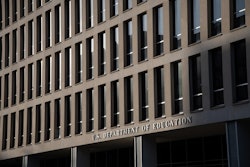Eleven Senate Democrats are demanding immediate answers from Education Secretary Linda McMahon after the Trump administration quietly suspended student loan forgiveness under the Income-Based Repayment program in July, leaving millions of borrowers in limbo despite having fulfilled their legal repayment obligations.
 Senator Bernie Sanders
Senator Bernie Sanders
The senators said the administration's decision comes at a time when families are already struggling with rising costs for healthcare, housing, childcare and other basic necessities.
"It is unacceptable for the Trump administration to take any action that delays or denies legally mandated debt relief to borrowers that have been in repayment for over two decades or more," the senators wrote to McMahon.
The suspension has raised serious questions about the Education Department's transparency and credibility with Congress. According to the letter, department staff told congressional committee staff on July 17 that loan discharges were still ongoing under IBR and that forgiveness was being actively processed. However, public reports emerged just five days later that the department had suspended the program earlier in July.
The department has cited a court injunction against the SAVE regulation as justification for the pause, but senators noted that injunction has been in place for months, making the sudden suspension in July difficult to explain.
"It is unclear how that information could be accurate given that just a few days later, it was publicly reported that the department had paused forgiveness earlier in July — several days prior to the briefing provided to Congress," the senators wrote.
Under the current suspension, borrowers who have already completed their required 20 or 25 years of repayment are being told to continue making payments with the promise of eventual refunds once forgiveness resumes. The department has provided no timeline for when that might occur.
The senators called this approach unacceptable, arguing that borrowers who have fulfilled their legal obligations should not be required to continue paying indefinitely without guarantee of timely relief.
Adding urgency to the situation is the approaching expiration of a federal tax exemption for forgiven student loan amounts at the end of 2025. The department already faces a significant processing backlog for income-driven repayment plans, and the continued suspension threatens to leave qualified borrowers facing substantial tax bills on debt relief they should have received without penalty.
The IBR suspension represents the latest challenge to federal student aid programs that have historically provided pathways to higher education for underrepresented and low-income students. Income-driven repayment plans were designed to make college more accessible by allowing borrowers to base payments on their income rather than loan balances, with forgiveness after extended repayment periods.
The 11 senators signing the letter include some of the chamber's most vocal advocates for education equity: Sanders, Mazie Hirono (D-Hawaii), Elizabeth Warren (D-Mass.), Tim Kaine (D-Va.), Jeff Merkley (D-Ore.), Peter Welch (D-Vt.), Ron Wyden (D-Ore.), Richard Blumenthal (D-Conn.), Alex Padilla (D-Calif.), Kirsten Gillibrand (D-N.Y.) and Jack Reed (D-R.I.).
The letter includes 11 specific questions demanding detailed information about the suspension, including exact dates when forgiveness was paused, justification for the delay given the months-old SAVE injunction, and plans for processing borrowers who have completed their required repayment periods.
The senators also want to know how many borrowers are affected, what has been communicated to loan servicers, and whether the department plans to establish a "buy back" process for borrowers whose payments are now deemed not to qualify for forgiveness.
They have requested written responses by August 30.
The suspension comes amid broader Republican efforts to restrict student loan relief. In June, Republicans in Congress passed legislation that would double student loan payments for average borrowers and increase college costs for working families, according to the senators.
The Education Department has not yet responded to requests for comment about the letter or provided updated timelines for resuming IBR forgiveness processing.
The burgeoning student debt crisis is unveiled in a new book by Dr. Jamal Watson, executive editor of Diverse and professor and associate dean of graduate studies at Trinity Washington University. You can order the book here.















